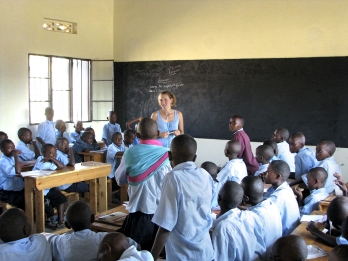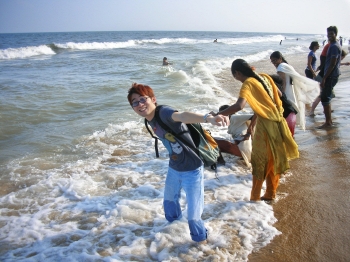COVER STORY
Cornell's global citizens roll up their sleeves and tackle real-world problems

Molly Warren 10, College of Human Ecology, presents a lesson to fourth-year Kagugu Primary School students in Kigali, Rwanda. She spent two months in the summer of 2008 in Kigali, working with the International Education Exchange and as a teacher trainer. See larger image
Georgia Tech, for example, has degree programs in France, Singapore, Italy, South Africa and China; Florida State University offers associate's and bachelor's degrees in liberal studies in Panama; Massachusetts Institute of Technology and the University of Chicago have programs in Singapore; and Yale has dozens of research collaborations with Chinese universities. Cornell is right on par, offering master's of professional studies degree programs in Ethiopia (in international agriculture, with an emphasis on watershed management) and in India (dual-degree programs in food science and plant breeding at Tamil Nadu Agricultural University); a joint master's degree program in hospitality with Nanyang Institute of Hospitality Management in Singapore; and an entire medical school in Qatar.
But money is the key, making these programs difficult to maintain during a period of challenge to university finances. Solving the developing world's most urgent problems -- hunger, depletion of natural resources, climate change, access to clean water, population growth and air pollution -- requires both big investments and cutting-edge interdisciplinary expertise in order to make international collaboration a reality.
Take the case of wheat rust, a pestilence spread by wind-riding spores that have devastated wheat in Uganda, Kenya, Ethiopia, Sudan, Yemen and Iran, and now threaten 15 percent of the world's wheat crop in Pakistan and India -- home to a billion of the world's poorest people.

Ming Lui and other Cornell students, in India for a two-week International Agriculture and Rural Development 602 field trip in January, bond with their hosts on the beach near their hotel in Chennai. See larger image
To attack this plague, Cornell leads the Durable Rust Resistance in Wheat project, a $27 million global partnership funded by the Bill and Melinda Gates Foundation involving plant breeders, economists, biotechnologists and data management specialists from 15 institutions.
The Gates Foundation is not the only funding institution with a global view. A new endowment from the Tata Education and Development Trust, a philanthropic entity of India's Tata Group, will allow more students from India to come to Cornell for an education and then take Western models and knowledge home with them after four years. (See story, below.)